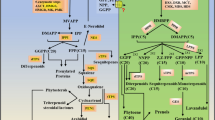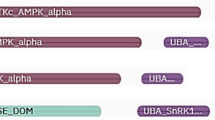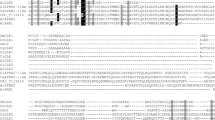Abstract
Key message
Two peanut LEC1-type genes exhibit partial functional redundancy. AhNFYB10 could complement almost all the defective phenotypes of lec1-2 in terms of embryonic morphology, while AhNF-YB1 could partially affect these phenotypes.
Abstract
LEAFY COTYLEDON1 (LEC1) is a member of the nuclear factor Y (NF-Y) family of transcription factors and has been identified as a key regulator of embryonic development. In the present study, two LEC1-type genes from Arachis hypogeae were identified and designated as AhNF-YB1 and AhNF-YB10; these genes belong to subgenome A and subgenome B, respectively. The functions of AhNF-YB1 and AhNF-YB10 were investigated by complementation analysis of their defective phenotypes of the Arabidopsis lec1-2 mutant and by ectopic expression in wild-type Arabidopsis. The results indicated that both AhNF-YB1 and AhNF-YB10 participate in regulating embryogenesis, embryo development, and reserve deposition in cotyledons and that they have partial functional redundancy. In contrast, AhNF-YB10 complemented almost all the defective phenotypes of lec1-2 in terms of embryonic morphology and hypocotyl length, while AhNF-YB1 had only a partial effect. In addition, 30–40% of the seeds of the AhNF-YB1 transformants exhibited a decreasing germination ratio and longevity. Therefore, appropriate spatiotemporal expression of these genes is necessary for embryo morphogenesis at the early development stage and is responsible for seed maturation at the mid-late development stage. On the other hand, overexpression of AhNF-YB1 or AhNF-YB10 at the middle to late stages of Arabidopsis seed development improved the weight, oil content, and fatty acid composition of the transgenic seeds. Moreover, the expression levels of several genes associated with fatty acid synthesis and embryogenesis were significantly greater in developing AhNF-YB10-overexpressing seeds than in control seeds. This study provides a theoretical basis for breeding oilseed crops with high yields and high oil content.





Similar content being viewed by others
Data availability
The authors confirm that the data supporting the findings of this study are available within the manuscript and its supplementary materials.
References
Akhtar S, Khalid N, Ahmed I et al (2014) Physicochemical characteristics, functional properties, and nutritional benefits of peanut oil: a review. Crit Rev Food Sci Nutr 54:1562–1575. https://doi.org/10.1080/10408398.2011.644353
Barkley N, Isleib T, Wang M et al (2013) Genotypic effect of ahFAD2 on fatty acid profiles in six segregating peanut (Arachis hypogaea L) populations. BMC Genet 14:62. https://doi.org/10.1186/1471-2156-14-62
Cagliari A, Turchetto-Zolet AC, Korbes AP et al (2014) New insights on the evolution of Leafy cotyledon1 (LEC1) type genes in vascular plants. Genomics 103:380–387. https://doi.org/10.1016/j.ygeno.2014.03.005
Casson SA, Lindsey K (2006) The turnip mutant of Arabidopsis reveals that LEAFY COTYLEDON1 expression mediates the effects of auxin and sugars to promote embryonic cell identity. Plant Physiol 142:526–541. https://doi.org/10.1104/pp.106.080895
Chen C, Chen H, Zhang Y et al (2020) TBtools: an integrative toolkit developed for interactive analyses of big biological data. Mol Plant 13. https://doi.org/10.1016/j.molp.2020.06.009
Das S, Parida SK, Agarwal P et al (2019) Transcription factor OsNF-YB9 regulates reproductive growth and development in rice. Planta 250:1849–1865. https://doi.org/10.1007/s00425-019-03268-2
Deng S, Wang R, Tao C et al (2023) Genome-wide analysis of CtNF-YB and lipid synthesis regulation of CtNF-YB12 in Carthamus tinctorius L. Plant Cell Rep 42:57–72. https://doi.org/10.1007/s00299-022-02936-0
Elahi N, Duncan RW, Stasolla C (2016) Modification of oil and glucosinolate content in canola seeds with altered expression of Brassica napus LEAFY COTYLEDON1. Plant Physiol Biochem 100:52–63. https://doi.org/10.1016/j.plaphy.2015.12.022
Ellerström M, Stålberg K, Ezcurra I et al (1996) Functional dissection of a napin gene promoter: identification of promoter elements required for embryo and endosperm-specific transcription. Plant Mol Biol 32:1019–1027. https://doi.org/10.1007/bf00041385
Harada JJ (2001) Role of Arabidopsis LEAFY COTYLEDON genes in seed development. J Plant Physiol 158:405–409. https://doi.org/10.1078/0176-1617-00351
Huang M, Hu Y, Liu X et al (2015) Arabidopsis LEAFY COTYLEDON1 mediates postembryonic development via interacting with PHYTOCHROME-INTERACTING FACTOR4. Plant Cell 27:3099–3111. https://doi.org/10.1105/tpc.15.00750
Jo L, Pelletier JM, Hsu SW et al (2020) Combinatorial interactions of the LEC1 transcription factor specify diverse developmental programs during soybean seed development. Proc Natl Acad Sci U S A 117:1223–1232. https://doi.org/10.1073/pnas.1918441117
Kumar S, Stecher G, Li M et al (2018) MEGA X: molecular evolutionary genetics analysis across computing platforms. Mol Biol Evol 35:1547–1549. https://doi.org/10.1093/molbev/msy096
Kumar S, Stecher G, Tamura K (2016) MEGA7: molecular evolutionary genetics analysis version 7.0 for bigger datasets. Mol Biol Evol 33:1870–1874. https://doi.org/10.1093/molbev/msw054
Kwong RW, Bui AQ, Lee H et al (2003) LEAFY COTYLEDON1-LIKE defines a class of regulators essential for embryo development. Plant Cell 15:5–18. https://doi.org/10.1105/tpc.006973
Lee H, Fischer RL, Goldberg RB et al (2003) Arabidopsis LEAFY COTYLEDON1 represents a functionally specialized subunit of the CCAAT binding transcription factor. Proc Natl Acad Sci U S A 100:2152–2156. https://doi.org/10.1073/pnas.0437909100
Lotan T, Ohto M, Yee KM et al (1998) Arabidopsis LEAFY COTYLEDON1 is sufficient to induce embryo development in vegetative cells. Cell 93:1195–1205. https://doi.org/10.1016/s0092-8674(00)81463-4
Meinke DW (1992) A homoeotic mutant of Arabidopsis thaliana with leafy cotyledons. Science 258:1647–1650. https://doi.org/10.1126/science.258.5088.1647
Mu JY, Tan HL, Zheng Q et al (2008) LEAFY COTYLEDON1 is a key regulator of fatty acid biosynthesis in Arabidopsis. Plant Physiol 148:1042–1054. https://doi.org/10.1104/pp.108.126342
Niu D, He Y (2019) LEAFY COTYLEDONs: old genes with new roles beyond seed development. F1000Res 8. https://doi.org/10.12688/f1000research.21180.1
Pouvreau B, Baud S, Vernoud V et al (2011) Duplicate maize Wrinkled1 transcription factors activate target genes involved in seed oil biosynthesis. Plant Physiol 156:674–686. https://doi.org/10.1104/pp.111.173641
Salvi P, Saxena SC, Petla BP et al (2016) Differentially expressed galactinol synthase(s) in chickpea are implicated in seed vigor and longevity by limiting the age induced ROS accumulation. Sci Rep 6:35088. https://doi.org/10.1038/srep35088
Santos-Mendoza M, Dubreucq B, Baud S et al (2008) Deciphering gene regulatory networks that control seed development and maturation in Arabidopsis. Plant J 54:608–620. https://doi.org/10.1111/j.1365-313X.2008.03461.x
Shen B, Allen WB, Zheng P et al (2010) Expression of ZmLEC1 and ZmWRI1 increases seed oil production in maize. Plant Physiol 153:980–987. https://doi.org/10.1104/pp.110.157537
Siriwardana CL, Kumimoto RW, Jones DS et al (2014) Gene family analysis of the Arabidopsis NF-YA transcription factors reveals opposing abscisic acid responses during seed germination. Plant Mol Biol Rep 32:971–986. https://doi.org/10.1007/s11105-014-0704-6
Stålberg K, Ellerström M, Josefsson LG et al (1993) Deletion analysis of a 2S seed storage protein promoter of Brassica napus in transgenic tobacco. Plant Mol Biol 23:671–683. https://doi.org/10.1007/bf00021523
Su H, Cao Y, Ku L et al (2018) Dual functions of ZmNF-YA3 in photoperiod-dependent flowering and abiotic stress responses in maize. J Exp Bot 69:5177–5189. https://doi.org/10.1093/jxb/ery299
Tan H, Yang X, Zhang F et al (2011) Enhanced seed oil production in canola by conditional expression of Brassica napus LEAFY COTYLEDON1 and LEC1-LIKE in developing seeds. Plant Physiol 156:1577–1588. https://doi.org/10.1104/pp.111.175000
Tang G, Xu P, Li P et al (2021) Cloning and functional characterization of seed-specific LEC1A promoter from peanut (Arachis hypogaea L.). PLoS ONE 16:e0242949. https://doi.org/10.1371/journal.pone.0242949
Tang G, Xu P, Liu W et al (2015) Cloning and characterization of 5′ flanking regulatory sequences of AhLEC1B gene from Arachis hypogaea L. PLoS ONE 10:e0139213. https://doi.org/10.1371/journal.pone.0139213
Tang G, Xu P, Ma W et al (2018) Seed-specific expression of AtLEC1 increased oil content and altered fatty acid composition in seeds of peanut (Arachis hypogaea L). Front Plant Sci 9:260. https://doi.org/10.3389/fpls.2018.00260
Terés S, Barceló-Coblijn G, Benet M et al (2008) Oleic acid content is responsible for the reduction in blood pressure induced by olive oil. Proc Natl Acad Sci U S A 105:13811–13816. https://doi.org/10.1073/pnas.0807500105
Waes JMV, Debergh PC (1986) Adaptation of the tetrazolium method for testing the seed viability, and scanning electron microscopy study of some Western European orchids. Physiol Plan 66:435–442
Wang D, Pei K, Fu Y et al (2007) Genome-wide analysis of the auxin response factors (ARF) gene family in rice (Oryza sativa). Gene 394:13–24. https://doi.org/10.1016/j.gene.2007.01.006
West M, Yee KM, Danao J et al (1994) LEAFY COTYLEDON1 is an essential regulator of late embryogenesis and cotyledon identity in Arabidopsis. Plant Cell 6:1731–1745. https://doi.org/10.1105/tpc.6.12.1731
Yang W, Lu Z, Xiong Y et al (2017) Genome-wide identification and co-expression network analysis of the OsNF-Y gene family in rice. The Crop Journal 5:21–31
Zemzoumi K, Frontini M, Bellorini M et al (1999) NF-Y histone fold alpha1 helices help impart CCAAT specificity. J Mol Biol 286:327–337. https://doi.org/10.1006/jmbi.1998.2496
Zhu J, Tang G, Xu P et al (2022) Genome-wide identification of xyloglucan endotransglucosylase/hydrolase gene family members in peanut and their expression profiles during seed germination. Peer J 10:e13428. https://doi.org/10.7717/peerj.13428
Zhu Y, Xie L, Chen GQ et al (2018) A transgene design for enhancing oil content in Arabidopsis and Camelina seeds. Biotechnol Biofuels 11:46. https://doi.org/10.1186/s13068-018-1049-4
Acknowledgements
We thank Jianru Zuo (Institute of Genetics and Developmental Biology, Chinese Academy of Sciences) for kindly providing us with the plasmid with 211-bp promoter of Napin A (211P) and the methods of vector construction.
Funding
This research was supported by grants from Natural Science Foundation of Shandong Province (ZR2021MC054), National Natural Science Foundation of China (30971546), Shandong Provincial Key Research and Development Program (2023LZGCQY019), Shandong Provincial Key Research and Development Program (2021LZGC025).
Author information
Authors and Affiliations
Contributions
GT conducted the experiments and drafted the manuscript, PX and CJ conducted the experiments, GL analyzed the data. LS and SW designed the study and revised the manuscript. All authors read and approved the final version.
Corresponding authors
Ethics declarations
Conflict of interest
The authors declare that they have no competing interests.
Additional information
Communicated by Attila Feher.
Publisher's Note
Springer Nature remains neutral with regard to jurisdictional claims in published maps and institutional affiliations.
Supplementary Information
Below is the link to the electronic supplementary material.
Rights and permissions
Springer Nature or its licensor (e.g. a society or other partner) holds exclusive rights to this article under a publishing agreement with the author(s) or other rightsholder(s); author self-archiving of the accepted manuscript version of this article is solely governed by the terms of such publishing agreement and applicable law.
About this article
Cite this article
Tang, G., Xu, P., Jiang, C. et al. Peanut LEAFY COTYLEDON1-type genes participate in regulating the embryo development and the accumulation of storage lipids. Plant Cell Rep 43, 124 (2024). https://doi.org/10.1007/s00299-024-03209-8
Received:
Accepted:
Published:
DOI: https://doi.org/10.1007/s00299-024-03209-8




